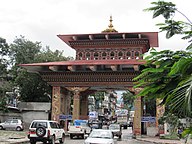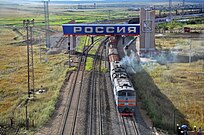
Back رقابة حدودية Arabic Sərhəd nəzarəti Azerbaijani সীমান্ত নিয়ন্ত্রণ Bengali/Bangla Control de fronteres Catalan Grænsekontrol Danish Grenzkontrolle German Landlima kontrolo Esperanto Control de fronteras Spanish کنترل مرزی Persian Rajavalvonta Finnish
This article may be too long to read and navigate comfortably. (December 2023) |
Border control comprises measures taken by governments to monitor[1] and regulate the movement of people, animals, and goods across land, air, and maritime borders. While border control is typically associated with international borders, it also encompasses controls imposed on internal borders within a single state.
Border control measures serve a variety of purposes, ranging from enforcing customs, sanitary and phytosanitary, or biosecurity regulations to restricting migration. While some borders (including most states' internal borders and international borders within the Schengen Area) are open and completely unguarded, others (including the vast majority of borders between countries as well as some internal borders) are subject to some degree of control and may be crossed legally only at designated checkpoints. Border controls in the 21st century are tightly intertwined with intricate systems of travel documents, visas, and increasingly complex policies that vary between countries.
It is estimated that the indirect economic cost of border controls, particularly migration restrictions, cost many trillions of dollars and the size of the global economy could double if migration restrictions were lifted.[2]
- ^ "Border Control Law and Legal Definition | USLegal, Inc". Archived from the original on 21 March 2019. Retrieved 3 August 2018.
- ^ "Do global migration barriers cost trillions?". American Economic Association. Archived from the original on 15 November 2023. Retrieved 15 November 2023.



